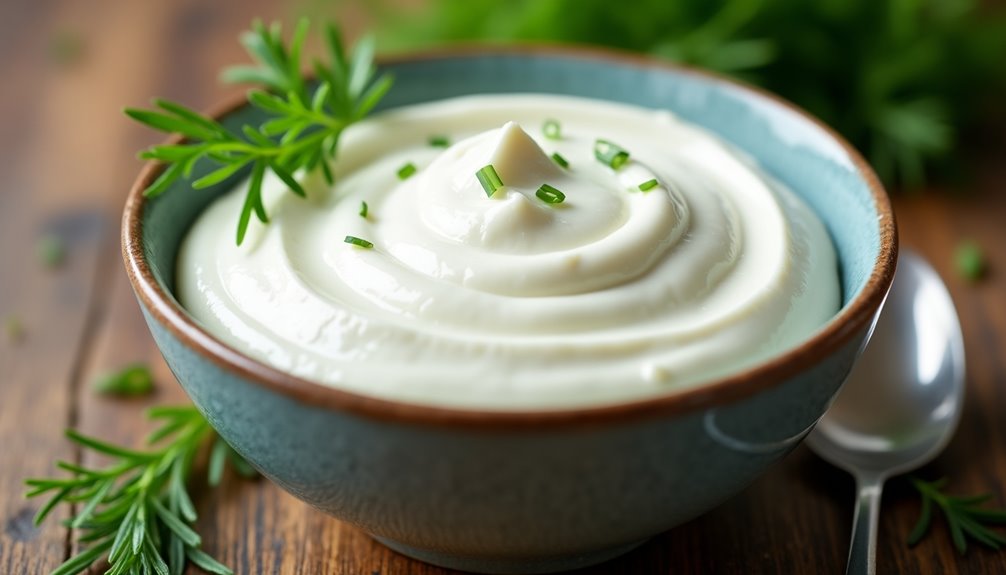Greek yogurt is a fantastic substitute for sour cream. It's creamier and thicker, offering a tangy flavor that enhances both sweet and savory dishes. Nutritionally, it packs nearly double the protein, is lower in calories, and has less sugar and fat than sour cream. When using it in recipes, start with a 1:1 substitution ratio, but you can adjust its thickness with milk or water if needed. Try it in dips, dressings, or baked goods for a healthier twist. There's more to explore about its versatility and fun recipe ideas, so keep going to discover additional insights!
Key Takeaways
- Greek yogurt can be used as a 1:1 substitute for sour cream in recipes, providing a healthier alternative.
- It has nearly double the protein and lower sugar content than sour cream, making it more nutritious.
- Greek yogurt has a creamier texture and tangy flavor, enhancing both sweet and savory dishes.
- Adjust the thickness of Greek yogurt by adding a little milk or water if needed for certain recipes.
- Experiment with Greek yogurt in dips and dressings to add a boost of flavor and health benefits.
Benefits of Greek Yogurt
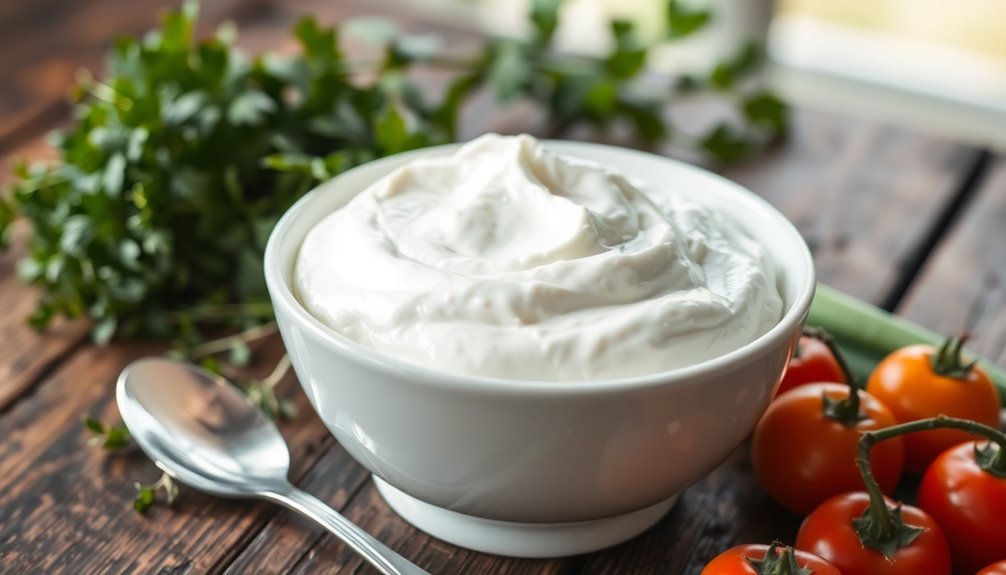
One of the most compelling advantages of Greek yogurt is its remarkable nutritional profile. Packed with protein, this creamy delight offers nearly double the amount found in regular yogurt, making it a perfect choice for those seeking to boost their protein intake. You'll appreciate how this nutrient-dense option supports muscle repair and growth, which is especially beneficial after workouts.
Moreover, Greek yogurt is lower in carbohydrates and sugar compared to its counterparts, which aligns well with a variety of dietary goals.
The health benefits don't stop there. Greek yogurt is also a rich source of probiotics, promoting gut health and enhancing digestion. By incorporating it into your daily routine, you'll foster a balanced microbiome, ultimately contributing to overall well-being. Additionally, it's an excellent source of calcium, essential for maintaining strong bones and teeth.
But what truly sets Greek yogurt apart is its versatility in recipes. You can easily swap it for sour cream in dips, dressings, or toppings, allowing you to enjoy the same creamy texture while reaping the nutritional rewards. You might even find it delightful in smoothies, baked goods, or as a base for savory dishes. This adaptability makes it a valuable staple in any kitchen, encouraging creativity and experimentation.
Flavor Comparison
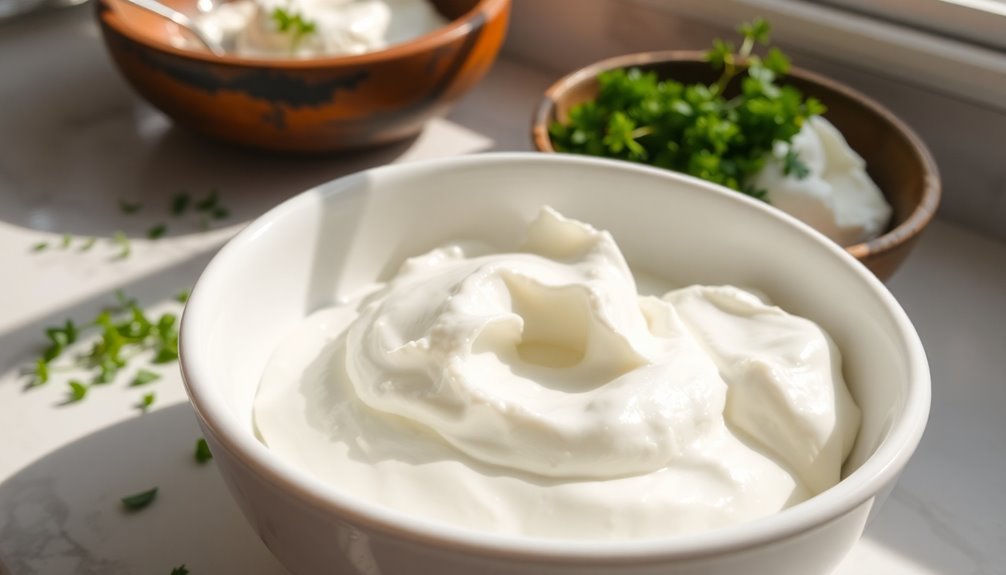
When comparing the flavors of Greek yogurt and sour cream, you'll notice some distinct differences that can influence your culinary choices. Both ingredients offer unique characteristics, but your taste preferences and the texture differences can significantly impact your dishes.
- Tanginess: Sour cream has a sharper, more pronounced tang, while Greek yogurt presents a milder, creamier tang. This subtle distinction can affect the overall flavor profile of your meals.
- Creaminess: Greek yogurt boasts a thicker, denser texture, which can add a luxurious mouthfeel to your dishes. In contrast, sour cream is lighter and smoother, making it easier to blend into dips and sauces.
- Versatility: Greek yogurt's more neutral flavor allows it to act as a versatile base for both savory and sweet dishes. Sour cream, with its distinct taste, often shines best in savory applications, such as tacos or baked potatoes.
- Cooking Properties: When heated, Greek yogurt can curdle, whereas sour cream tends to hold its shape better in hot dishes. This difference can influence how you choose to incorporate each into your cooking.
Ultimately, the choice between Greek yogurt and sour cream comes down to your taste preferences and the specific dish you're preparing. By understanding these flavor nuances and texture differences, you'll be better equipped to make delicious culinary decisions that resonate with your palate.
Nutritional Profile
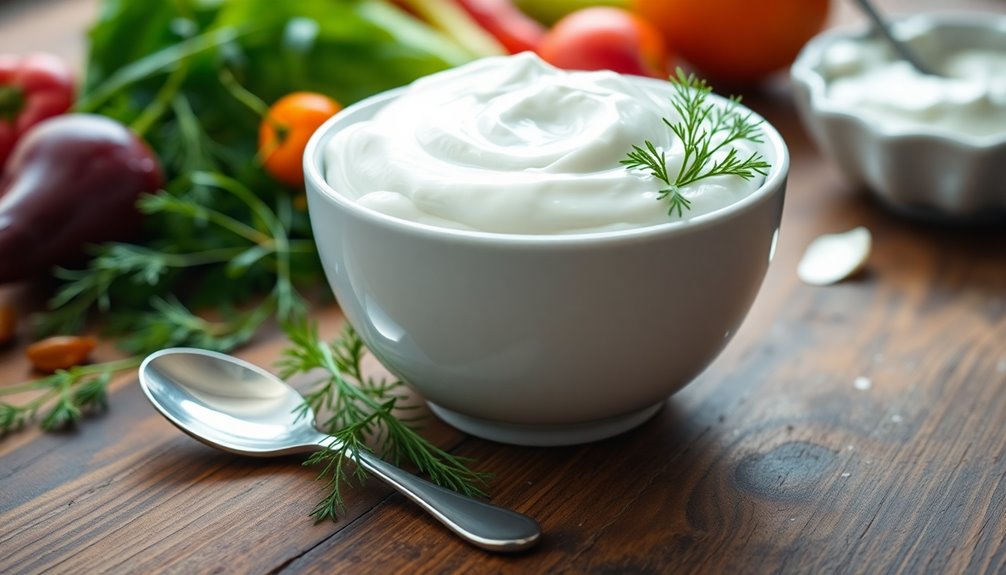
The nutritional profiles of Greek yogurt and sour cream reveal significant differences that can influence your dietary choices. Greek yogurt is often lower in calories and fat than sour cream, making it an appealing option if you're looking to reduce your caloric intake. A typical serving of Greek yogurt contains around 100 calories, while sour cream can have about 120 calories or more per serving. This difference adds up, especially if you're incorporating these ingredients into multiple meals.
In terms of protein, Greek yogurt stands out as a powerhouse, boasting nearly double the protein content of sour cream. This high protein content not only supports muscle health but also helps you feel fuller for longer, which can aid in weight management. Additionally, Greek yogurt is rich in probiotics, offering various health benefits, including improved digestive health and a strengthened immune system.
When it comes to fat content, you'll find that many Greek yogurts come in low-fat or non-fat varieties, providing a versatile ingredient for those who want to enjoy creamy textures without the extra calories. Sour cream, on the other hand, typically contains higher levels of saturated fat, which mightn't align with everyone's health goals.
Cooking and Baking Tips
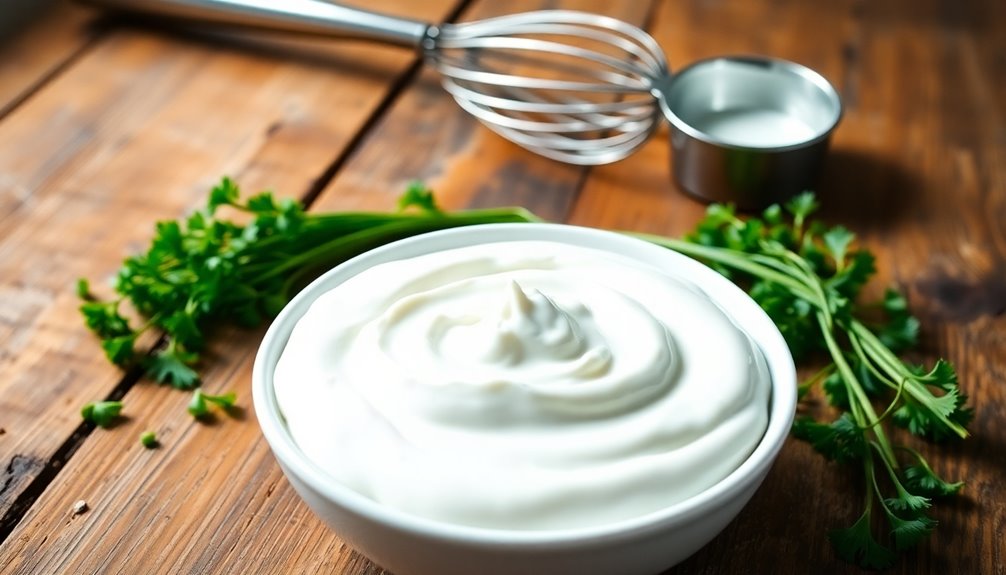
Greek yogurt's unique properties make it a versatile substitute for sour cream in various cooking and baking applications. Its creamy texture and tangy flavor can elevate your dishes while providing a healthier option. Here are some practical tips to help you incorporate Greek yogurt seamlessly into your recipes:
- Start with a 1:1 Ratio: When substituting Greek yogurt for sour cream, begin by replacing it in equal parts. This way, you maintain the intended flavor and consistency of your dish.
- Adjust for Thickness: If you find the Greek yogurt too thick for your recipe, consider thinning it with a splash of milk or water. This adjustment can help achieve the desired consistency without sacrificing taste.
- Incorporate into Dressings: Use Greek yogurt in salad dressings and dips. Combine it with herbs and spices for a healthy twist on classic recipes. Taste testing here is essential to balance flavors to your preference.
- Experiment with Recipe Modifications: Don't hesitate to make minor recipe modifications when using Greek yogurt. It works well in baked goods, providing moisture and a slight tang. Just keep an eye on baking times, as they may vary.
Ideal Recipes to Try
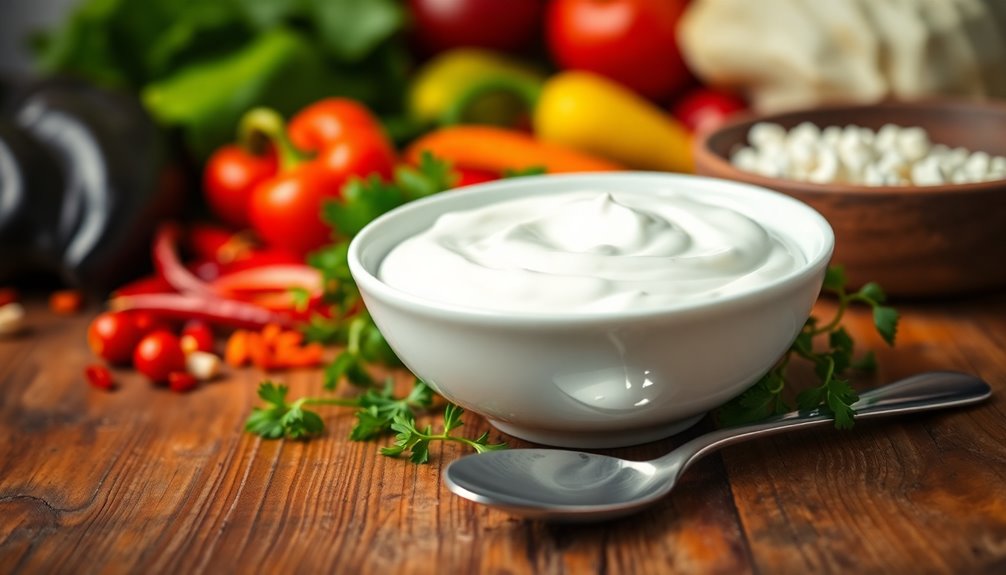
Whether you're looking to enhance your favorite comfort foods or create healthier versions of classic dishes, incorporating Greek yogurt as a substitute for sour cream opens up a world of delicious possibilities. Here are some ideal recipes you can try that highlight the versatility of Greek yogurt while keeping your meals light and flavorful.
| Recipe | Description |
|---|---|
| Greek Yogurt Ranch Dip | Whip together Greek yogurt, herbs, and spices for a creamy dip perfect for veggies and chips. |
| Creamy Greek Salad Dressing | Combine Greek yogurt, lemon juice, garlic, and olive oil for a tangy dressing that elevates your salad. |
| Spicy Greek Yogurt Dip | Mix Greek yogurt with sriracha and lime for a zesty dip that pairs beautifully with grilled meats and veggies. |
These recipes not only satisfy your cravings but also help you enjoy the creamy texture of dips and dressings without the extra calories. When you're preparing a gathering, these creamy dips serve as crowd-pleasers, while tangy dressings can enhance the freshness of your dishes.
Experiment with different herbs and spices to tailor these recipes to your taste, and don't hesitate to share your creations with friends and family. You'll find that substituting Greek yogurt for sour cream not only enriches your meals but also fosters a sense of belonging as you share delicious food together. Immerse yourself in these recipes and enjoy the flavorful journey!
Substitution Ratios
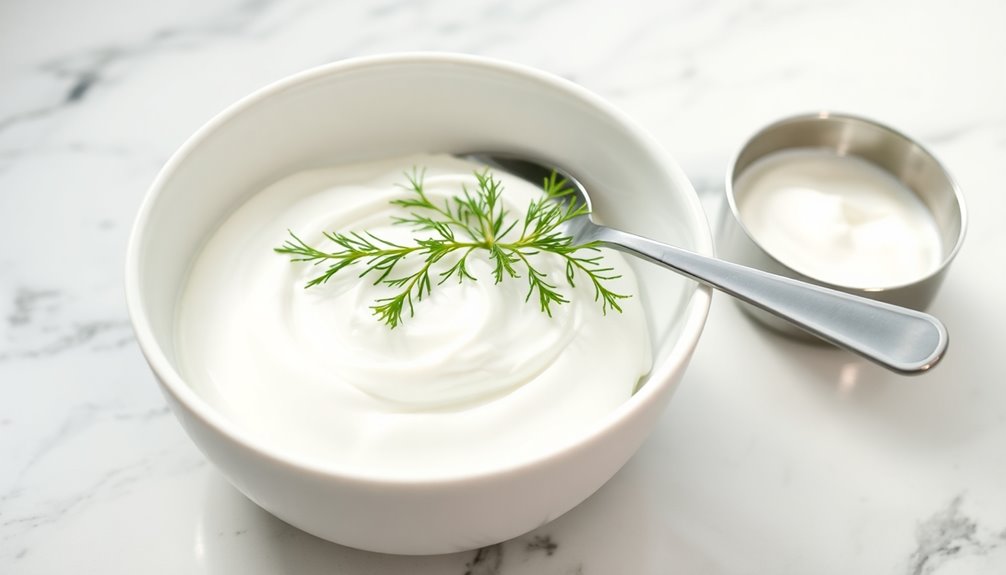
Many home cooks often wonder how to effectively substitute Greek yogurt for sour cream in their recipes. Understanding the right substitution ratios can help you achieve the desired flavor and texture in your dishes. Here's a quick guide to help you navigate these recipe conversions:
- 1:1 Ratio: For most recipes, you can directly substitute Greek yogurt for sour cream. This works well in dips and dressings where you want a similar consistency.
- Adjust for Thickness: If your recipe calls for a thicker sour cream, consider using a bit less Greek yogurt or adding a splash of milk to reach the desired texture.
- Taste Testing: Always taste your dish as you go. Greek yogurt has a tangier flavor than sour cream, so you might want to adjust seasonings accordingly.
- Health Benefits: Remember, using Greek yogurt not only enhances the health benefits of your dish—providing more protein and probiotics—but it can also create a creamier texture, especially in baked goods.
While Greek yogurt may have slightly different texture differences compared to sour cream, the nutritional advantages and versatility it offers make it a fantastic option. Embrace these substitutions and enjoy experimenting in your kitchen! By keeping these ratios in mind, you'll find that integrating Greek yogurt into your recipes can lead to delicious results without sacrificing flavor.
Storage and Shelf Life

When it comes to storing Greek yogurt as a substitute for sour cream, understanding proper storage practices is essential for maintaining its quality and freshness. Greek yogurt can be a versatile ingredient in your kitchen, but improper storage can lead to spoilage and waste. To keep your yogurt at its best, always store it in the refrigerator at a temperature of 40°F (4°C) or lower. This temperature helps inhibit the growth of harmful bacteria, ensuring that the yogurt remains safe to eat.
Make sure to keep the yogurt tightly sealed in its original container or use an airtight container. This not only prevents contamination but also protects it from absorbing odors from other foods. If you've opened a container, try to consume it within five to seven days for optimum flavor and texture.
For extended shelf life, consider freezing Greek yogurt. While it may change the texture slightly, it can still be used in cooking or baking later. When you're ready to use it, thaw it in the refrigerator overnight.
Remember to check the expiration date on the packaging, and always trust your senses. If you notice any off smells, discoloration, or mold, it's best to discard it. By following these proper storage guidelines, you can enjoy Greek yogurt in your meals while minimizing waste and maximizing its delicious potential.
Common Myths Debunked
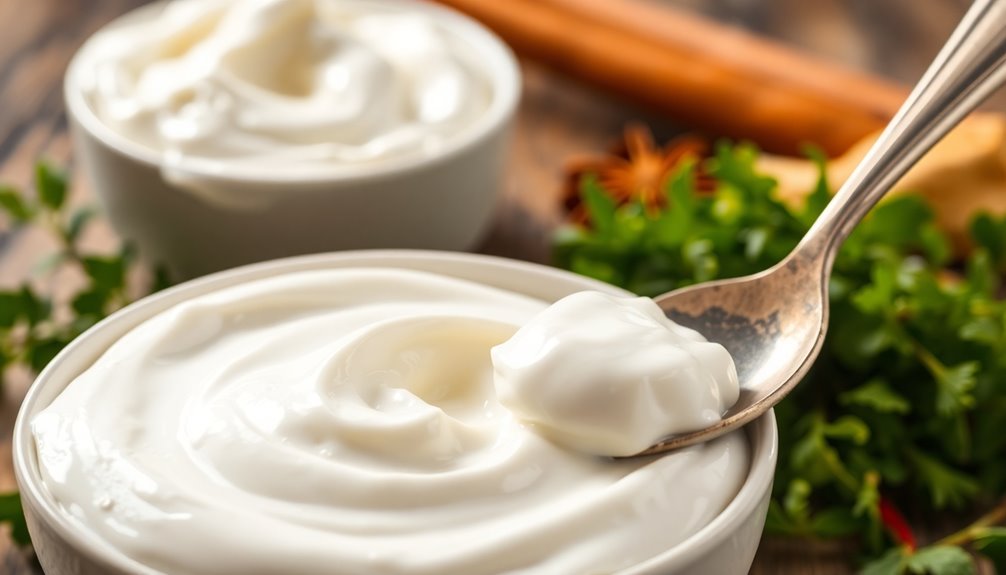
You might've heard various claims about using Greek yogurt as a substitute for sour cream, but not all of them hold true. Let's debunk some common myths surrounding this popular swap, so you can make informed choices in your kitchen.
1. Greek Yogurt Tastes Just Like Sour Cream:
While Greek yogurt has a creamy texture, it often has a tangier flavor. A taste test can reveal that some people may prefer one over the other, depending on the dish.
2. Using Greek Yogurt Means Sacrificing Flavor:
This myth suggests that Greek yogurt lacks the richness of sour cream. However, Greek yogurt can add its own unique flavor profile, enhancing your dishes while providing health benefits like lower fat content and higher protein.
3. It's Always a Healthier Option:
While Greek yogurt generally has more protein and fewer calories, not all brands are created equal. Always check the labels to avoid added sugars or unnecessary ingredients.
4. You Can Substitute It in Any Recipe:
While it works well in many instances, some recipes with delicate balances of flavors may not adapt well to Greek yogurt. A little experimentation is key.
Frequently Asked Questions
Can Greek Yogurt Be Used in Place of Sour Cream in Dips?
When you think about using Greek yogurt for dips, it's a wise choice that brings both flavor and nutritional benefits.
Regarding flavor comparison, Greek yogurt provides a tangy richness similar to sour cream, while having fewer calories and more protein. This makes it a healthier alternative for your dips, enabling you to savor the same creamy texture without sacrificing taste or nutrition.
You'll feel fantastic about this substitution!
Is Greek Yogurt Suitable for Lactose-Intolerant Individuals?
If you're lactose intolerant, Greek yogurt might be a suitable option for you. It often contains lower lactose levels than traditional dairy products, making it easier to digest. Plus, many brands offer lactose-free varieties as dairy alternatives.
You'll also benefit from its probiotic properties, which can support gut health. Just remember to check labels for lactose content, ensuring it aligns with your dietary needs while enjoying a creamy, delicious option.
How Does Greek Yogurt Affect the Texture of Baked Goods?
When you use Greek yogurt in your baked goods, you'll notice a significant change in baking consistency. Its thicker texture can enhance the structure, making your cakes and muffins more stable.
Additionally, it improves moisture retention, keeping your treats tender and fresh longer. This combination of qualities can elevate your baking, creating delightful results that invite everyone to enjoy your creations.
You'll find that Greek yogurt is a versatile ingredient worth incorporating.
Can Greek Yogurt Be Whipped Like Sour Cream?
Sure, you can whip Greek yogurt, but let's not pretend it'll transform into a fluffy cloud like whipped cream. Using a proper whipping technique, you'll find it thickens nicely, but the flavor differences are undeniable—tangy versus creamy.
For those seeking alternatives, it's a healthier option, but don't expect it to store the same way. Embrace the quirks of yogurt, and you might just find a new favorite in your kitchen!
What Are Some Common Brands of Greek Yogurt for Cooking?
When you're exploring recipe substitutions, several Greek yogurt brands shine in cooking. Fage, Chobani, and Oikos are popular choices, each offering a creamy texture and tangy flavor perfect for various dishes. Cooking with dairy alternatives like Greek yogurt can elevate your meals while providing health benefits.
If you're seeking sour cream alternatives, these brands work wonders in dips, dressings, and baked goods, making your culinary creations both delicious and nutritious.
Conclusion
Switching to Greek yogurt instead of sour cream is like discovering a secret superfood hidden in your fridge! Not only do you get a creamy, tangy flavor that elevates your dishes, but you're also packing in protein and cutting calories—it's practically a culinary miracle! With its versatile nature, Greek yogurt transforms everything from dips to desserts. So, why stick to the typical when you can reveal this exceptional ingredient in your kitchen? Your taste buds will thank you!

